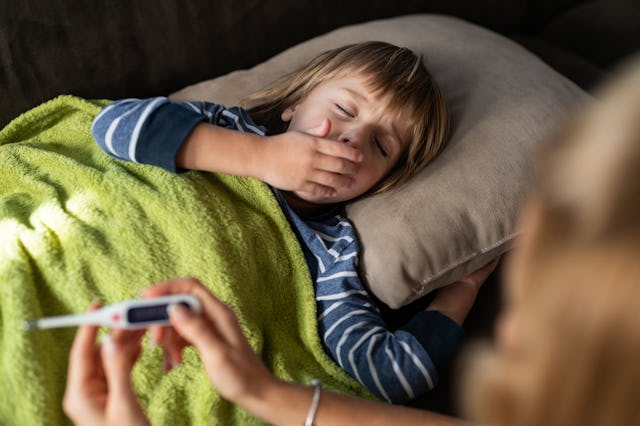What Does A COVID Cough Sound Like?
Here's how to know whether that cough is COVID-related or caused by something else.

With so many contagious illnesses going around these days (seriously, so many!), it’s understandable if you’re still worried about COVID-19 hitting your household. After all, the virus is still relatively new, and it’s unclear what the long-term impacts of COVID might be after one infection or multiple in both kids and adults alike.
So if your kid starts coughing, you might be wondering whether it’s time to schedule that PCR test and keep them isolated from the other members of your household. Curious about what a COVID cough sounds like, and if it differs from the coughs caused by other respiratory illnesses? Keep reading to see what two pediatricians say on the matter.
Is that cough COVID or something else?
Unfortunately, there’s no telltale coughing sound that will tell you with certainty that your kid’s got COVID, explains Dr. Mary Carol Burkhardt, a pediatrician and associate division director for Primary Care at Cincinnati Children’s Hospital Medical Center. “Coughing can definitely be a sign of COVID, but it is not the only sign and isn’t always present when a child has COVID,” Burkhardt tells Scary Mommy. “The type of cough can vary between people regardless of age. This makes diagnosis of COVID from the sound or type of cough very imperfect. Testing is really necessary to determine if someone does or does not have COVID.”
“Types of cough can differ, as nasal passage size and mucus production can differ among different age groups,” adds Sara Siddiqui, M.D., FAAP, a pediatrician and clinical assistant professor in the Department of Pediatrics at NYU Langone’s Hassenfeld Children’s Hospital in New York.
Both doctors agree that cough can present in a multitude of pediatric illnesses, including but not limited to COVID, influenza, RSV, dozens of common cold viruses, seasonal allergies, asthma symptoms, gastroesophageal reflux, and more. If COVID is a concern (say, your child has been around someone who then tested positive), Siddiqui recommends “checking for associated signs and symptoms such as fever, congestion, respiratory rate, frequency of cough, and whether it worsens in the day or at night.”
OK, but what about croup cough?
If your child presents with a cough that sounds like a seal barking, you might be especially alarmed. Siddiqui notes that this bark-like cough can be caused by croup, a viral illness that can inflame the upper airway and cause a high-pitched cough similar to a seal bark, most frequently impacting children between six months and six years old.
There are several viruses that can cause croup, Burkhardt notes. “Parainfluenza virus (aka HPIV) is the most common cause of croup. Other viruses, such as COVID, flu, and RSV, could potentially also cause croup, but these are not as likely causes of a ‘barking cough.’ This barking cough typically will resolve with time alone.” If your kid makes a high-pitched sound while breathing in, called stridor, along with a barky cough, call your pediatrician, she suggests.
When should you call your doctor?
A cough alone isn’t necessarily enough to call your doctor, Burkhardt adds, since coughs are caused by so many different viruses. It’s important to rest and drink fluids if your child is otherwise feeling OK.
“Know that some viral coughs can really linger — as long as 3-6 weeks — which feels like a really long time and often prompts parents to worry why it is not going away faster,” she adds. Try home remedies such as honey, but, Burkhardt notes, “we do not recommend cough and cold medicines in children, as they usually don’t work and often have unwanted side effects in children.”
“You should seek medical care for your child if the cough is accompanied by a fever for more than 48 hours or so, if your child is not drinking enough to make wet diapers or use the restroom, or if your child’s breathing is heavy or labored,” says Burkhardt.
Get your kid checked out if the cough is persistent or worse during the day or night, is accompanied by shortness of breath or difficulty breathing, wheezing, or has a bark- or seal-like sound, Siddiqui says. “A chronic cough can also be related to gastroesophageal reflux as well.”
Treatment will vary depending on the reason for the cough, notes Siddiqui, but both doctors emphasize that you should always check in with your child’s doctor if you are concerned about what you’re hearing or any related symptoms. With regards to their cough, Siddiqui notes: “Sometimes we order different testing to determine the cause, ranging from a chest X-ray, bacterial or viral swabs detecting various infectious causes, allergy testing, and possible asthma testing.” No matter the cause, your child’s doctor will help guide you toward the best treatment options for your little one and get them feeling better ASAP.
This article was originally published on